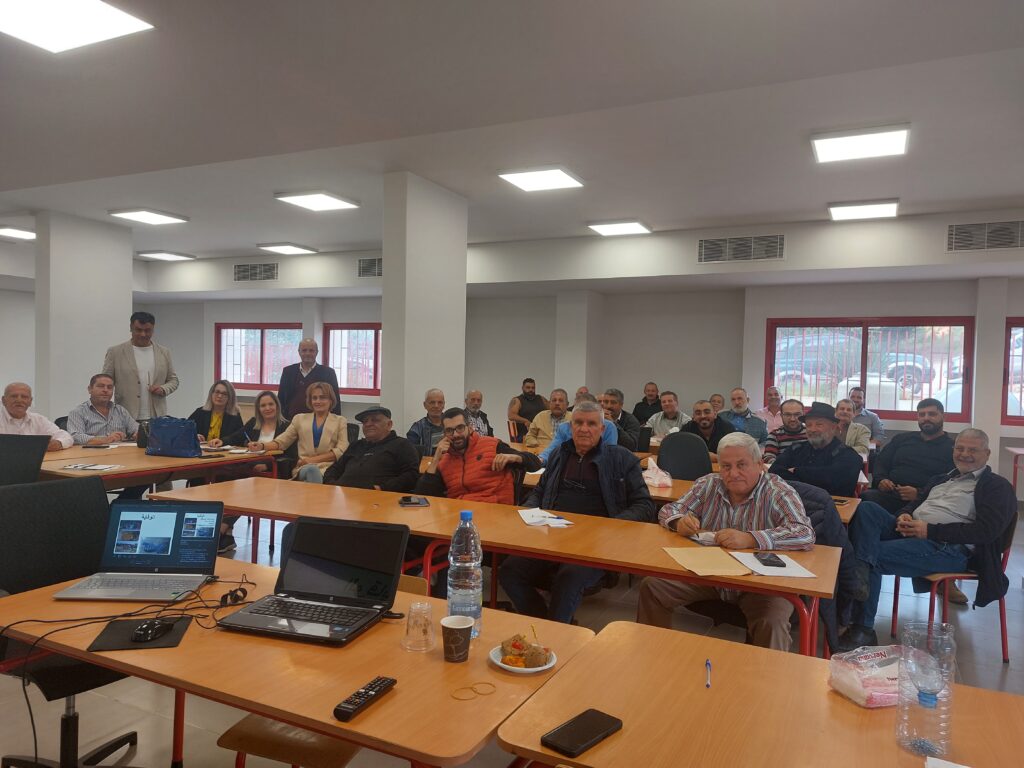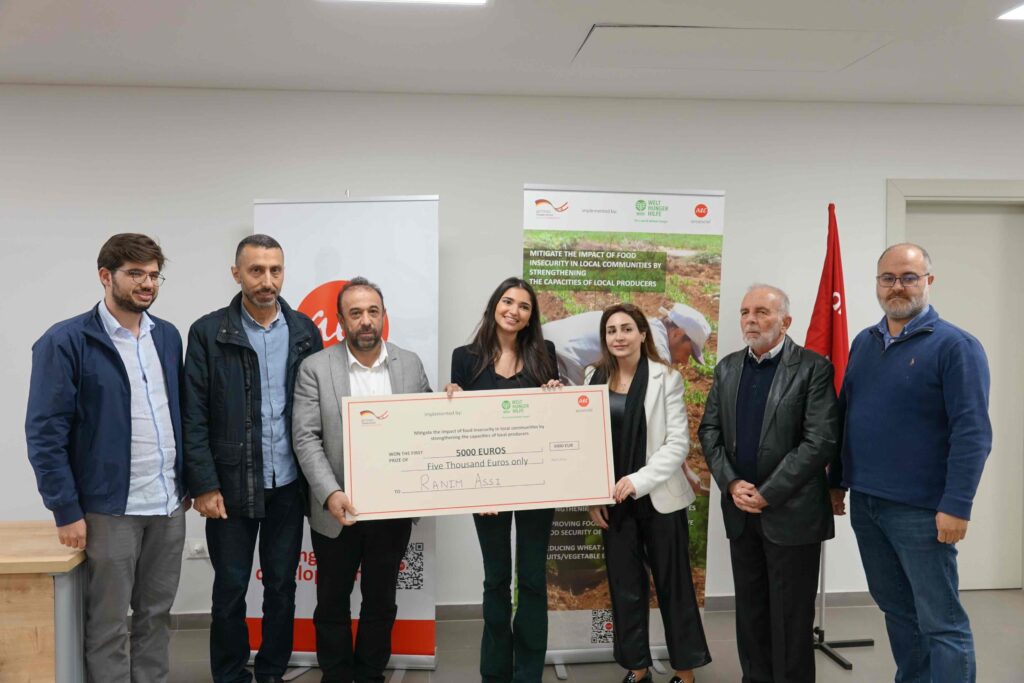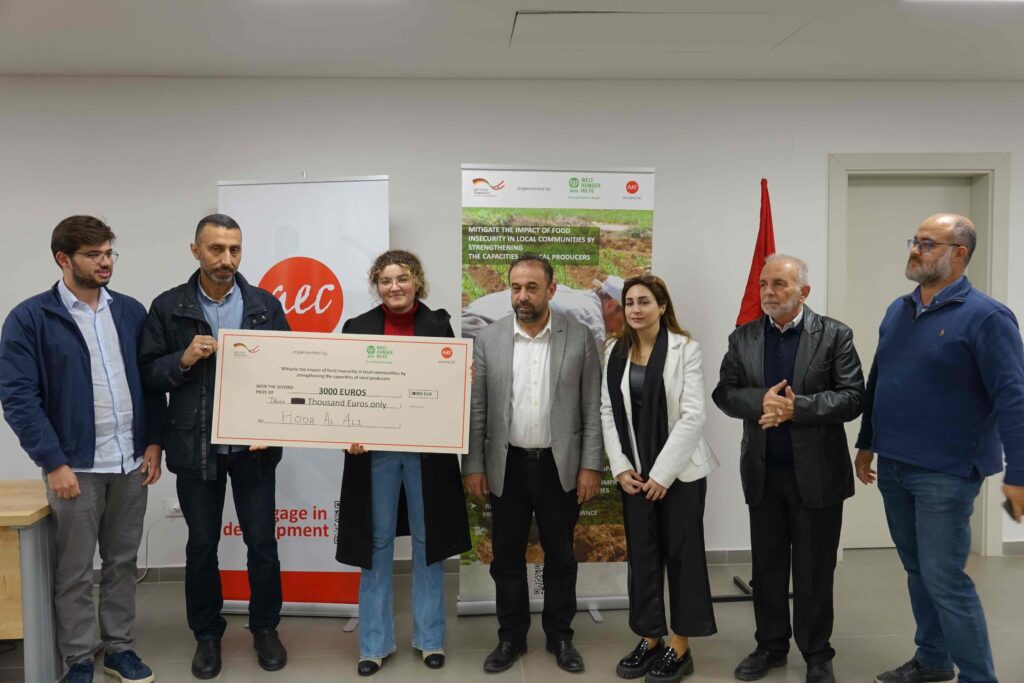



Funded by Deutsche Gesellschaft für Internationale Zusammenarbeit (GIZ), and implemented by Welthungerhilfe and arcenciel, the agro-food project took place in Lebanon, over the course of the year 2023.
The project, called: ‘ mitigate the impact of food insecurity in local communities by strengthening the capacities of local producers”, started out with an outreach to smallholder farmers, who were supported through contract farming, provision of technical guidance, and soil and water laboratory tests (In the Bekaa Governorate). This in turn allowed them to sell their wheat production to large companies, helping them be more sustainable economically.
The second outcome of the project was more focused on the Beit El Mouzareh (BEM) initiative, which is a social enterprise under arcenciel. The purpose of the outcome was to enlarge BEM food outlets, products profile and beneficiaries. Agro-food processors and cooperatives trained on good hygiene and manufacturing practices and supported with in-kind support. Then, several farmers under “BEM” food outlets were supported with technical guidance.
The third outcome of the project supported Farmers and Agro-food processors through technical skills, collaborations within multiple sectors of fruits and vegetables value chain in South and Shouf, and in-kinds.

The fourth outcome had experts from universities and institutions that work in the agro-food industry gather around round tables to identify key challenges. From these challenges, experts suggested topics later worked on by a selection of 10 participants. These 10 participants were selected from a pool of young students and entrepreneurs. Each participant chose a topic to tackle, working closely with an expert for about 2 months, to develop a solution to the challenge.
We will look at Ranim Assi and Houda Al Ali’s solutions. The challenges they took on were respectively ‘Sustainability and waste utilization’’, and ‘Use of local crops in the development of innovative products’’.
Ranim found an interesting way of maximizing the apple juice’s waste usage, ‘Being naturally observant and curious, I often find myself exploring my surroundings. During my regular trips to Laklouk, a village in Lebanon renowned for its apple orchards, I couldn’t help but notice the substantial amount of apple waste, particularly from the process of making apple juice concentrates. The sight of so much apple pomace being discarded sparked an idea in me that there must be a way to repurpose this waste for something beneficial.’’ The idea behind her project ‘Valorizing apple waste to pectin’’, is to turn leftover apple bits into pectin powder, which helps the environment by reducing waste. It makes jams healthier by cutting sugar and adding fiber without changing the taste. Also, it creates jobs for women and locals, reduces reliance on imports, and boosts local production, making a big difference for the community and environment. It bore great fruit, as she won the first prize of 5 000 Euros at the award ceremony in December.

In second place, winner of 3 000 Euros, Houda, chose to address the challenge of ‘Use of local crops in the development of innovative products’’ with a project called ‘’Freeks’’. Houda’s cousin planted wheat, made some Freekeh (Which is the equivalent of rice for our country) and had an excess of it. She then decided to make snacks out of it. Her project consisted of creating a snack, based of freekeh, which is, Antioxidant-rich, crunchy and satisfying, Lactose free, of multiple unique flavors, locally sourced, and cost efficient.

Houda, with retrospective, considered the project to be ‘a great experience, giving hope and trust that the product could be developed ‘’. In the near future, she and her team will look for better equipment, to eventually be able to commercialize their product abroad.
arcenciel is thankful for this project to have happened, allowing a better access to healthy food, promoting local agro-food industry and empowering local actors in the agricultural sector. We address our gratitude to WHH and GIZ, our respective partner and donor, who allowed the project to take place.